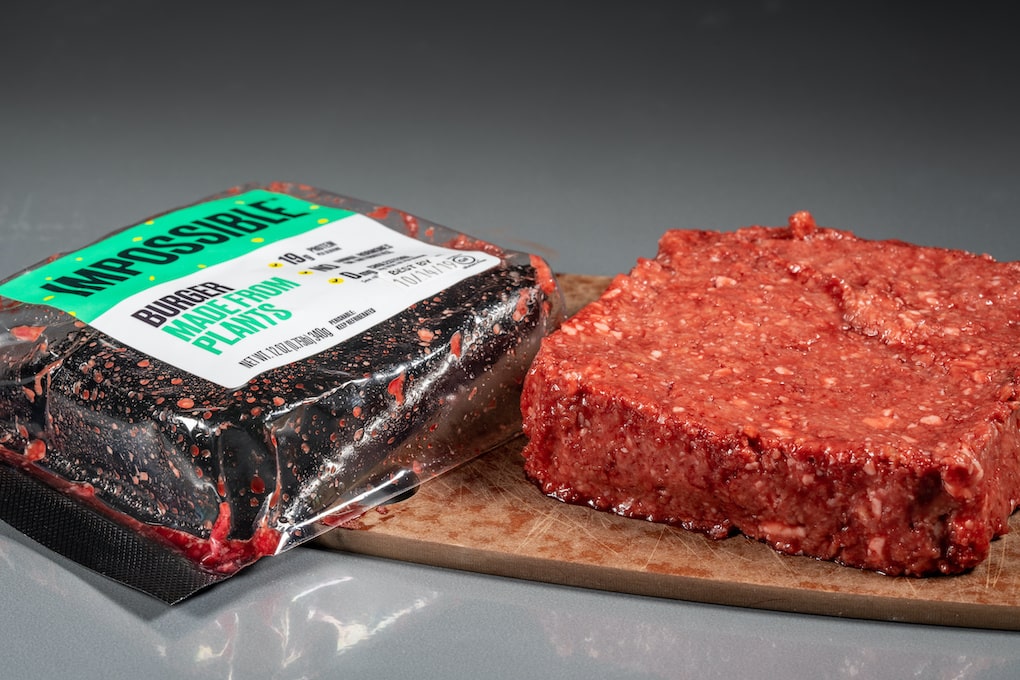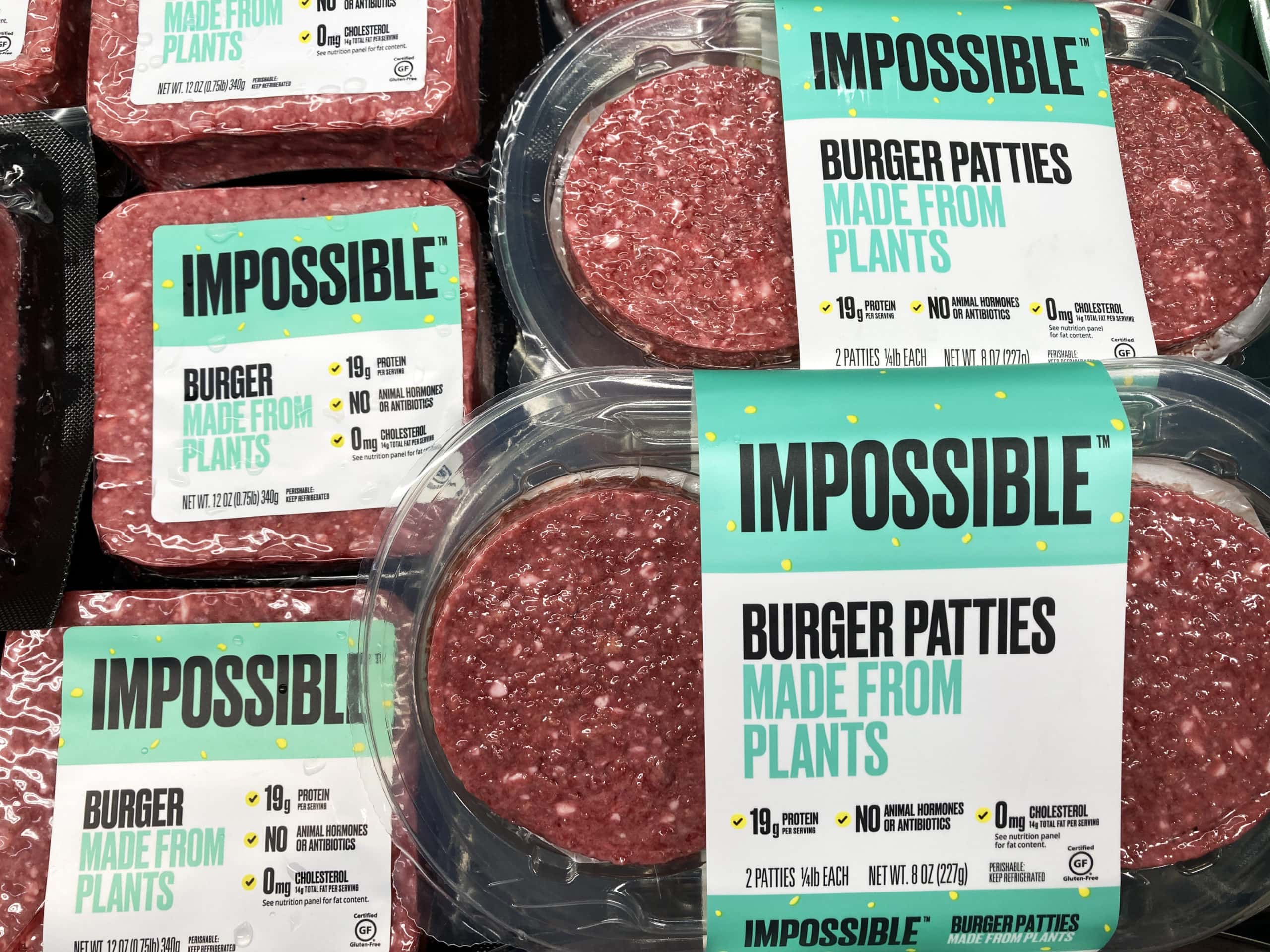Today we’re going to answer a question a lot of people are asking “Is the impossible burger healthy?”
You may have heard of the Impossible Burger lately as it’s been taking mainstream restaurants by storm. Long ago are the days of having black bean burgers as the only vegetarian or vegan alternative to a beef burger. Impossible meat is a plant-based product that cooks like meat and looks like meat and even has a similar taste to beef. It’s pretty astonishing to see, and vegans everywhere are so excited to have a legitimate option when they go out to eat. But is it healthy? And is it ok for people with diabetes to eat? Let’s find out.
Table of Contents
Is The Impossible Burger Healthy?
The Impossible Burger is a plant-based patty derived from a few key ingredients formulated to give it that “beefy” look and taste. Using a combination of soy and potato proteins, impossible meat can get a thick meaty texture and provide protein nutrition. Those proteins give it its main structure, but a few key ingredients give it the flavor and look needed to look like imitation meat. Heme (yeast extract) gives it some flavor, coconut and sunflower oil make it juicy, and methylcellulose and food starch help bind it together.
The Impossible Burger (and sausage) has brought eating a plant-based lifestyle to another level. You can now find it in place of Whoppers, Starbucks breakfast sandwiches, and the grocery store to live out your best vegan chili dog dreams. The company used the 80/20 beef (20% fat content) as their model for the new and improved Impossible Burger. It ended up being 14g total fat, 8g saturated fat, and 0mg cholesterol. A 4 oz. serving of the Impossible Burger also has 240 calories, 370mg of sodium, 9g of carbs, and 19g of protein. Plus tons of vitamins including Thiamin, Vitamin B12, Folate, Iron, and Zinc.
The Benefits of Following a Plant-Based Diet.
There are many benefits to following a plant-based diet that isn’t just to avoid eating animals and animal products. It’s also great for the planet as cattle are responsible for 62% of agricultural emissions, and it takes a lot less water to grow fruit and vegetables vs. meat, dairy, and eggs. But the health benefits also outweigh eating a high meat diet. A plant-based diet can do the following:
Lower Your Cholesterol
There’s a lot of cholesterol and fat in meat, and a healthier, more plant-based diet can help lower cholesterol by at least 10%. Those who completely switch over to a vegan diet can lower their LDL cholesterol (the bad kind) by up to 25%. Diabetes can raise your LDL and lower your HDL (the good cholesterol), and so following a healthy diet is key to counteracting this.
Decrease Risk of Cancer and Stroke
There are tons of cancer-preventative nutrients found in certain foods (fruits, vegetables, beans, and nuts) that can help combat cancer risk. Those vitamins include high fiber, minerals, and phytochemicals. Also, your risk of stroke goes up if you have diabetes, and if you also have high cholesterol, high blood pressure, or are overweight, your risk goes up even more. A plant-based diet can help prevent a lot of these medical conditions and help fight back against your high risk due to diabetes.
Lose Weight
People with diabetes should maintain a healthy weight to feel good and prevent complications with their diabetes that can be associated with being overweight and lack of physical activity. Eating more fruits, vegetables, and legumes in your diet can lower calorie intake slightly but also fill your body with healthy, nutrient-rich foods to help manage your blood sugar levels and both look and feel good.
Improve Heart Health & Lower Blood Pressure
Again, meat has a lot of saturated fat in it that can affect your heart health and clog arteries. A healthy heart is key to a long life and will decrease your risk of complications with diabetes—the same for high blood pressure. Introducing less fatty meat and more healthy oils, fruits, and vegetables to your diet is key to protecting yourself from developing cardiovascular disease and other issues. Any health condition on top of your diabetes is going to increase risk. Check out this list of foods to help lower blood pressure.
And Even Help Prevent Type 2 Diabetes
As we know, Type 1 diabetes is insulin-dependent diabetes, and although diet and exercise can help manage it, it will never be cured. Type 1 diabetes, on the other hand, can become onset in adulthood and even go into remission with proper management and care. Following a plant-based diet can help prevent type 2 diabetes and help manage it. You can help lower cholesterol and reduce fatty tissue overall, making your body more resistant to insulin. Again, this does require people to ensure the plant-based diet they are on isn’t just avoiding meat but includes good foods that are healthy such as healthy low-fat oils and low-sugar fruits.
Is the Impossible Burger Good for Diabetes?
People with diabetes can definitely benefit from eating a low-carb, high protein, more plant-based diet because it can help with their overall health and wellbeing. With just 9 grams of net carbs, the Impossible Burger definitely falls under a good low-carb diet. Still, people with diabetes need to make sure they are getting enough carbs to work with their insulin regimen and the proper amount of vitamins and healthy fruits and vegetables. So, eat up, and enjoy!
Learn More About A Healthy Diet!
For more information on following a balanced diet with low-carb foods, please read our guide on foods to eat and which ones to avoid here. And for an easy-to-manage diabetes program, check out our Pops Rebel app in the app store and our glucose meter kit online today!












